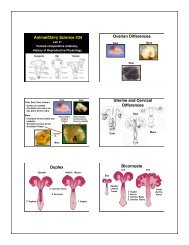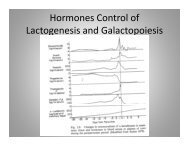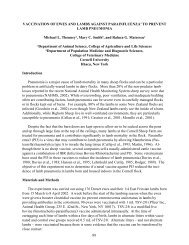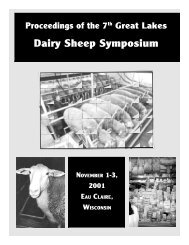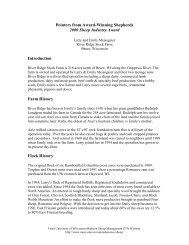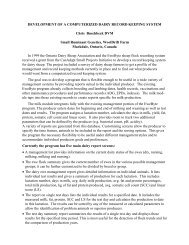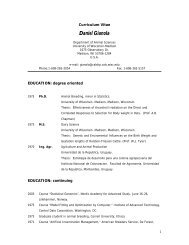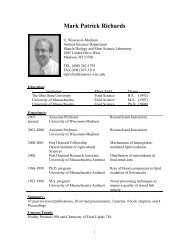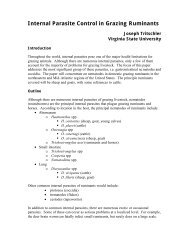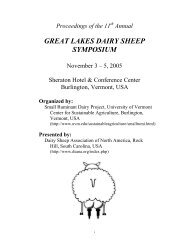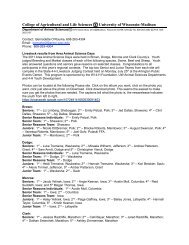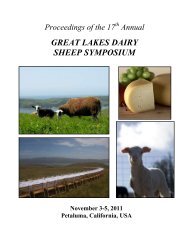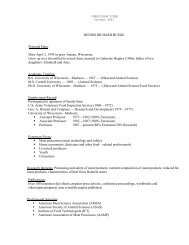great lakes dairy sheep symposium - the Department of Animal ...
great lakes dairy sheep symposium - the Department of Animal ...
great lakes dairy sheep symposium - the Department of Animal ...
Create successful ePaper yourself
Turn your PDF publications into a flip-book with our unique Google optimized e-Paper software.
Out <strong>of</strong> this allocation, <strong>the</strong> Dairy Business Innovation Center (DBIC) was created. The DBIC,<br />
as a non-pr<strong>of</strong>it organization, attempts to help <strong>the</strong> industry develop new markets, new products,<br />
and new processes. Clients range from small farmstead producers through some <strong>of</strong> Wisconsin’s<br />
largest cooperative and private <strong>dairy</strong> manufacturers. The DBIC, a virtual center without<br />
buildings or <strong>of</strong>fice space, contracts with state and national <strong>dairy</strong> consultants and partners to bring<br />
expertise to approved clients. Among <strong>the</strong> DBIC partners are <strong>the</strong> Wisconsin Milk Marketing<br />
Board (WMMB), <strong>the</strong> Wisconsin Cheese Makers Association, <strong>the</strong> UW-System, Wisconsin state<br />
agencies (DATCP, Commerce, Tourism, etc) and <strong>the</strong> Center for Dairy Research. Fur<strong>the</strong>r<br />
information on <strong>the</strong> DBIC can be found at www.dbicusa.org.<br />
An Overview <strong>of</strong> Challenges and Solutions Facing <strong>the</strong> Small-Scale Cheese Maker<br />
Within <strong>the</strong> last sixty years, <strong>the</strong> cheese industry has witnessed enormous changes and<br />
challenges both in Europe and <strong>the</strong> United States, and none has been more adversely affected than<br />
<strong>the</strong> small-scale cheese producer.<br />
When it comes to cheese, <strong>the</strong> U.S. has traditionally looked to Europe for inspiration.<br />
However, <strong>the</strong> European cheese industry has faced tremendous challenges and changes over <strong>the</strong><br />
last sixty years and as a result, <strong>the</strong> U.S. can learn from European mistakes and successes. Whilst<br />
Europe – and in particular <strong>the</strong> U.K. and France – have been primarily concerned with preserving<br />
<strong>the</strong> traditions <strong>of</strong> farmhouse cheese production, <strong>the</strong> U.S. is trying to establish those traditions.<br />
In <strong>the</strong> U.K., many factors contributed to <strong>the</strong> decline <strong>of</strong> <strong>the</strong> traditional farmhouse cheese: <strong>the</strong><br />
consequences <strong>of</strong> two world wars, subsequent changes in agricultural policy, <strong>the</strong> industrialization<br />
<strong>of</strong> agriculture, and <strong>the</strong> disappearance <strong>of</strong> <strong>the</strong> specialty retailer and cheese store led to near<br />
obliteration <strong>of</strong> small-scale cheese production. Equally worrying, was <strong>the</strong> parallel decline <strong>of</strong> <strong>the</strong><br />
specialty knowledge needed to produce and sell such cheeses.<br />
By <strong>the</strong> mid-1980’s, <strong>the</strong> farmhouse cheese industry in <strong>the</strong> U.K. was in crisis. Traditional<br />
British cheeses had all but disappeared and had been replaced by factory-produced versions,<br />
carrying <strong>the</strong> same name but bearing no resemblance to <strong>the</strong> original thing. Unlike France or Italy,<br />
<strong>the</strong> UK has no AOC/DOP system designed to protect <strong>the</strong> names or recipes <strong>of</strong> specialist cheeses.<br />
For example in 1939, <strong>the</strong>re were 405 on-farm producers <strong>of</strong> Cheshire. By 1986, <strong>the</strong>re was one<br />
producer - <strong>the</strong> Appleby family - remaining.<br />
However, despite this bleak picture, <strong>the</strong>re was hope. It came in <strong>the</strong> form <strong>of</strong> a small group <strong>of</strong><br />
people, spearheaded by Randolph Hodgson at Neals Yard Dairy, who were determined to<br />
prevent <strong>the</strong>se producers from becoming extinct. In <strong>the</strong> early days, <strong>the</strong> key to success lay in<br />
establishing a knowledgeable retail and wholesale outlet that could handle and sell farmhouse<br />
cheese. The crucial part lay in establishing a close working relationship between store and<br />
producer, providing <strong>the</strong>m with feedback, paying <strong>the</strong>m a fair price (and on time) and selling <strong>the</strong>ir<br />
cheeses to <strong>the</strong> end consumer in <strong>the</strong> condition that <strong>the</strong> producer would wish it to be sold. The net<br />
result <strong>of</strong> all this was that <strong>the</strong> producer was left to do <strong>the</strong> thing that <strong>the</strong>y do best – make cheese.<br />
The o<strong>the</strong>r crucial role <strong>of</strong> <strong>the</strong>se stores was to provide an educational platform for <strong>the</strong> public and to<br />
5



